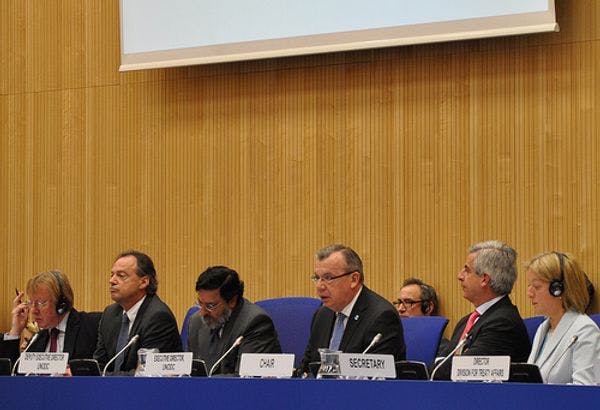“That which we call a rose”: Member states go toe to toe at this week’s CND Inter-Sessional Meeting on the meaning of “harm reduction”
At the most recent Inter-Sessional Meeting of the UN Commission on Narcotic Drugs (CND) in Vienna, a handful of Member States took the floor to spar over the term “harm reduction” in the Joint Ministerial Statement that they have already spent several months negotiating.
The final Statement will be presented at a High Level Segment of CND next March, and aims to review achievements and challenges since the 2009 Political Declaration and Plan of Action was adopted. This means that the stakes are high for Member States to defend historically entrenched drug policy positions. Delegations in Vienna are taking instructions from their capitals about acceptable wording relating to demand reduction, supply reduction and money laundering (the three “pillars” of the 2009 Declaration). The final Statement is supposed to be agreed by consensus, yet each of the 50+ paragraphs currently has edits, revisions and question marks in it – and there clear divisions between participating Member States.
This means they are all engaging in a lengthy process of defending, rejecting or amending language. Member States either kept silent, tried to find compromise, or drew ‘red lines’ under issues deemed non-negotiable. The big screen showing the draft text at the front of room was a bloodbath of red ‘tracked changes’ as UNODC staff valiantly tried to keep up with the verbal duels on the floor.
Much of today’s action focused on the term “harm reduction” in a paragraph that reads like a shopping list of drug related health services and vulnerable populations. The USA, Canada, Egypt, Ecuador, China, Colombia and Russia wanted to delete the term “harm reduction” altogether. Colombia stated “we don’t have it in our national legislation so we don’t see the point”, and Canada (one of the first implementers of harm reduction back in the 1980s) said it was concerned because “we don’t believe we all mean the same thing… there are a number of different approaches in harm reduction.”
In response, Lithuania (on behalf of all 28 European Union Member States), the UK, France, Ireland, Slovenia and Switzerland all supported the inclusion of “harm reduction”. The delegate from Spain dug his heels in, declaring in a statement that is worth reproducing in full:
“The term is accepted worldwide in the scientific community. We will be in parallel to reality if we go to other language; we will be moving differently from the practical realm and the reality of the concept. We don’t know how we can rename things that are completely agreed, practiced, and supported even in countries where they want another name. We cannot go along with these proposals. Harm reduction is an accepted term in scientific and health environments so we don’t see another solution.”
At this, the delegate from China dug in his heels, saying he was “not convinced that the reference of the term harm reduction was overwhelmingly accepted” – including by the scientific community. Switzerland informed participants that harm reduction “is one of the pillars of our national drug policy approved by popular referendum”, to which Egypt replied that their “national legislation does not constitute the words harm reduction. We would ask to remove it for the simple reason that we cannot generalize one country’s polices and impose on others.” Spain then came back with, “We also have our reality. We are not imposing anything… Not all paragraphs [in the Joint Ministerial Statement] have to be applicable to whole international community… if we put this caveat [proposed by Russia] on national legislation, we all can leave.”
Then we did all leave, because what was supposed to be a two-day negotiation was closed after just three hours by the Chair, Mr. Antonio Garcia Revilla from Peru. He has now committed to redrafting the Statement through private meetings with relevant Member States, ahead of the next Inter-Sessional meeting on 11th December. It will be interesting to see how he manages this clear division – as well as others – among Member States.
Keep up-to-date with drug policy developments by subscribing to the IDPC Monthly Alert.
